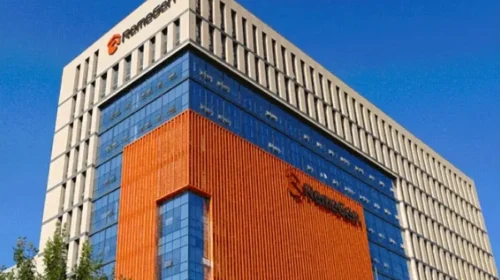Café de Coral slumps as dark clouds hover over restaurant industry

Hong Kong’s leading fast-food operator and rival Fairwood have both issued profit warnings this month as growing consumer caution takes a bite from their business
Key Takeaways:
- Café de Coral said it expects to report its profit fell 30% year-on-year in the six months to September, the first half of its fiscal year
- Hong Kong’s leading fast-food chain could face more turbulence as competition looks set to intensify in the local restaurant market
By Lau Chi Hang
The past two weeks have been tough for Piony Leung, who took over as CEO of Café de Coral Holdings Ltd. (0341.HK) in April this year. Just a half year after taking the reins, Leung issued her maiden financial announcement for Hong Kong’s leading fast-food operator, which probably left most investors with indigestion. Making matters worse, the profit warning her company issued earlier this month follows a blowout year prior to her arrival as the chain rebounded strongly after Hong Kong relaxed its tough pandemic restrictions.
According to its new profit warning, Café de Coral expects its profit to drop by up to 30% during the six months to September, the first half of its fiscal year, compared with its HK$200 million ($25.7 million) profit a year earlier. The company blamed the decline on a severe and unexpected downturn in Hong Kong as the economy slowed and also as local residents headed across the Mainland China border for better value. It also cited a high base effect from the year-ago period, as sales rebounded strongly post-pandemic last year.
Rival Fairwood Holdings (0052.HK) also issued a profit warning last week, blaming similar factors for a 50% to 60% year-on-year profit decline for the six months to September this year from the HK$36.3 million profit it reported in the year-ago period.
The reality is that fast food is already near the bottom end of the catering food chain, meaning the falling fortunes at both Fairwood and Café de Coral probably point to people dining out less in general. That might explain the increasing popularity of pre-packed lunch boxes that are one of the cheapest options on the dining-out food ladder.
Storm clouds gathering
As the economies in both Hong Kong and on the Chinese Mainland remain sluggish and property markets remain weak, consumers are less willing to loosen their purse strings to spend on little luxuries like dining out. That’s creating headaches for a wide range of operators across the restaurant spectrum.
Hong Kong’s restaurant receipts in this year’s third quarter fell 1.3% year-on-year to HK$26.7 billion, extending a of 2% decline in the second quarter to HK$27.1 billion, according to the Hong Kong Census and Statistics Department. While one quarter of decline could be an aberration, two consecutive quarters seems to mark the start of a downward trend.
The Mainland’s catering industry looks slightly better, with National Bureau of Statistics data showing revenue rose 3.1% year-on-year in September to 441.7 billion yuan ($61 billion). But the increase was mainly due to ongoing price wars that pushed up sales volume without any actual profit growth, according to the China Cuisine Association.
According to business information website Tianyancha, the number of Chinese restaurants whose licenses were canceled or revoked reached 1.06 million in the first half of this year, already equal to 75% of the 1.4 million total for all 2023, reflecting the difficulties the industry is facing.
Cross-border dining trips
The weak Mainland Chinese catering market will undoubtedly pose a major challenge to Café de Coral as it looks to resume its expansion across the border. At the same time, the company’s core Hong Kong business is taking a hit from a more recent dining trend in the city.
Following the pandemic’s end, people in Hong Kong started to cross the border in growing numbers to visit Shenzhen, which has more Chinese dining options and better value for the money. While the trend may eventually pass, like others before it, things are unlikely to return to the way they once were, not least because the Mainland offers lower prices and bigger shopping malls for daily excursions with much better quality of goods and services.
Despite the difficulties, Café de Coral isn’t sitting by idly and has launched a host of measures to try to see it through the rough patch. The company plans to unveil value offers and step up its own discounts and other promotions in Hong Kong. On the Chinese Mainland, its stores will focus on attracting customers with their own promotions and strategic branding.
Heating competition in Hong Kong
Most of Café de Coral’s measures, from value menus to discounts and promotions, are focused on price cuts or introducing cheaper food to attract more customers, the same strategy many Mainland companies are using. But as fast-food operators in Hong Kong cut prices, it’s probably only a matter of time before other restaurants in the city follow suit to claw back some of their lost business.
What’s more, Hong Kong restaurants are facing greater competition as more aggressive Mainland rivals enter their home turf. Those include Jiumaojiu (9922.HK), whose Tai Er chain is known for its trendy steaming dishes of “sauerkraut fish,” the formerly trendy Green Tea chain, and beef hotpot chain Baheli. Such names are all heavy-hitters on the Mainland, with deep pockets and abundant experience serving Chinese customers. Ominously for their Hong Kong peers, such companies are often willing to sacrifice profits to grab more market share. Delivery of their competitive instincts to Hong Kong could permanently alter the market, putting greater pressure on local restaurants.
In discussing its outlook, Café de Coral said in its latest announcement: “Although the macro economic outlook remains volatile for the foreseeable future, the group remains confident in its competitiveness.” It stressed its strong fundamentals and steady focus on improvement should position it well once the economy starts to recover.
That seems to be another way of saying there’s not much the company can do in the current market and that growth opportunities might not come until a recovery begins down the road. The reality for now is that Hong Kong diners are increasingly going to the Mainland to eat out, while Mainland chains continue to break into the Hong Kong market.
Despite its enviable record that has allowed Café de Coral to weather numerous cyclical downturns in the past, the company and its peers could be facing an unprecedented change with a major structural shift now sweeping through Hong Kong. Exactly who will be left standing when the waves settle down remains to be seen.
To subscribe to Bamboo Works free weekly newsletter, click here






